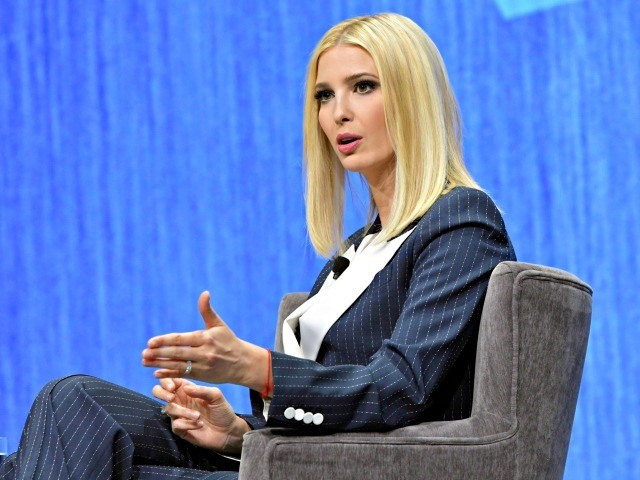A damning Government Accountability Office (GAO) report issued Wednesday slammed the U.S. Agency for International Development (USAID) for mishandling funding and assigned responsibilities to carry out Ivanka Trump’s signature women’s empowerment initiative launched in the last administration.
USAID so haphazardly managed Ivanka’s Women’s Global Development and Prosperity (W-GDP) Initiative, the congressional watchdog was unable to determine whether it actually worked.
The GAO report also highlighted USAID’s failure in implementing the bipartisan 2018 Women’s Entrepreneurship and Economic Empower Act (WEEE Act) that provided support for Ivanka’s initiative.
Despite corporate media reports suggesting otherwise, the GAO primarily focused on USAID problems related to the agency’s efforts to target micro, small, and medium-sized enterprise (MSME) development funding to women and the poor and better monitor the outcome. USAID was only one of ten agencies receiving funding from Ivanka’s program.
The GAO’s 58-page report only mentions Ivanka’s W-GDP Initiative in one paragraph:
According to USAID documents, the Women’s Global Development and Prosperity (W-GDP) Initiative, launched in February 2019, will strengthen the ability of efforts to advance women’s entrepreneurship. Officials at six of the 10 missions we contacted said they have applied or received WGDP funding as of summer 2020. USAID officials said they expect W-GDP–funded MSME activities to increase in the future and to support WEEE Act goals.
Ivanka launched W-GDP weeks after her father signed the WEEE Act.
W-GDP, described as a “whole-of-government approach” by supporters, was designed to deliver targeted financing to women’s efforts in ten different U.S. agencies, including USAID. It also aimed to codify gender analysis.
The main goal of Ivanka’s effort was to support low-income women entrepreneurs worldwide.
Ivanka’s program required USAID to spend at least $265 million on MSME assistance. USAID had to split the money 50/50 between efforts to support women and the very poor, with the expectation of some overlap.
However, the GAO found:
USAID had not developed a process to support compliance with statutory requirements to target MSME resources to activities that reach the very poor and to small and medium-sized enterprise resources to activities that reach enterprises owned, managed, and controlled by women.
USAID had also failed to implement a process to send the money to the targeted programs successfully, had not kept track of its funding to MSME enterprises, and had not developed any guidelines for what constitutes a business run by women.
The GAO reported:
We identified three key gaps that impair USAID’s ability to develop such a process. First, USAID has not identified the total funding subject to the targeting requirements. Second, although USAID has programs designed to help the very poor, it is unable to determine the amount of funding that reaches this group. Third, although USAID has MSME activities that benefit women, it has not defined enterprises owned, managed, and controlled by women and does not collect data by enterprise size.
These gaps leave USAID unable to determine what percentage of its MSME resources is going to the very poor and enterprises owned, managed, and controlled by women.
The GAO found more problems at USAID that would ultimately impact Ivanka’s efforts, including collecting and reporting incomplete and inconsistent data in its process for monitoring MSME assistance.
Officials from the congressional watchdog concluded:
Without providing guidance to missions on their roles in identifying very poor populations, as well as defining enterprises that are owned, managed, and controlled by women and collecting data that would enable reporting by enterprise size, USAID does not have reasonable assurance that it is meeting its statutory requirements [under WEEE Act].
To rectify its problems, the GAO issued six recommendations for USAID, including establishing “a definition for enterprises owned, managed, and controlled by women” and developing new mechanisms to assure that the money is going to the intended programs.
According to Politico, USAID agreed with the recommendations.
The GAO reviewed financial accounts and interviewed USAID staffers located around the globe during its 14-month audit.

COMMENTS
Please let us know if you're having issues with commenting.